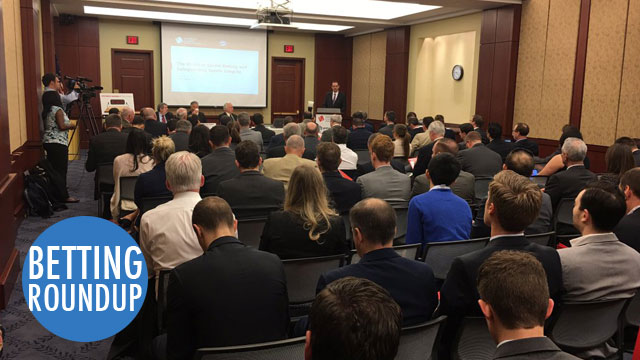Twice weekly, we’ll comb through as many articles, tweets and podcasts as we can find related to the world of sports betting and daily fantasy sports, and publish the good stuff here.
Stumble upon something you think we should include? Email info@bettingtalk.com.
* * *
The American Gaming Association made their case for legalizing sports betting in the United States during a Capitol Hill briefing on Wednesday.
The AGA spent $340,000 on lobbying during the first three months of 2016, after spending $350,000 during the same period a year ago. Among the issues they lobbied on was New Jersey’s appeal to the Third Circuit U.S. Court of Appeals in order to allow sports betting in the state, U.S. House filings show.
As part of its effort to push for legalization, the AGA on Wednesday held a morning-long program on Capitol Hill to showcase how sports betting can be properly regulated, featuring officials from countries that already do it.
“You will see us out there week in and week out,” Freeman said. “If heads are in the sand, the AGA is going to do its best to pull them out.”
Here’s the press release on the event from the AGA.
Legal Sports Report breaks down the event.
Could Major League Baseball be closer to supporting sports betting? An article published on Forbes’ website suggests that a merger between sports data and analysis technology companies that partner with MLB might be a moment for the league to re-evaluate their position on gambling.
Sports betting largely remains illegal across the U.S. despite illegal gambling being at an all-time high. The results of Manfred’s offseason discussions are unknown, along with whether there will be a change in MLB’s institutional position. However, MLB is now a partner alongside numerous sports betting and lottery entities that look to Genius Sports to improve customer performance and drive profits.
Progress of single-event sports betting legalization in Canada seems to have reversed from earlier in the week. Now, Federal Liberals say they will oppose the bill.
It’s a sudden about face by the Liberals, who, when in opposition, voted in favour of a similar bill tabled by former Windsor-Tecumseh NDP MP Joe Comartin, about five years ago. Back then, Bill C-290 received all-party support and eventually made its way to the Senate, where it languished for three years and died after the call of last year’s federal election.
“With the Liberals, you’ve just got to be prepared for them switching position,” Masse said.
Masse said the NDP and the bill’s supporters, which includes several Canadian chambers of commerce and Unifor, one of Canada’s largest private sector unions, were under the impression that “we would get a free vote, at the very least.”
That doesn’t appear to be on the horizon for the Liberals.
“The government will be opposing the bill,” Sean Casey, Liberal MP for Charlottetown and the parliamentary secretary to the minister of justice and attorney general, said Tuesday.
Illinois and Tennessee both made steps this week toward legalizing and taxing fantasy sports betting.
The Illinois House gave its initial approval to a measure that would legalize betting on daily fantasy sports on Wednesday, but some lawmakers expressed concern about whether the bill has been properly vetted, and its chances at full passage remain uncertain.
The proposal would regulate how the online businesses operate by dictating who can play and by taxing and charging operators licensing fees. Only people 21 and older could play, and employees at the companies would be barred from participating in the contests.
Tennessee’s Legislature passed a bill that would make clear that fantasy sports betting is legal, but would also regulate it and put a tax on it.
The Senate passed the Fantasy Sports Tax Act on Tuesday, and the bill (HB2105) is now on its way to the governor. The legislation follows a state attorney general issued legal opinion issued earlier this month that said fantasy sports contests are illegal gambling.
The measure says online companies that offer the contests must be licensed by the state. The measure also generally limits players to betting no more than $2,500 per month, unless they can show that the limit should be increased. And it would allow the state to impose a 6 percent gambling tax on the adjusted revenue of fantasy sport operators.
Derek Stevens, owner of Downtown casinos The D Las Vegas and Golden Gate, recently purchased Glitter Gulch, Mermaids and La Bayou.
The three venues are of strategic importance to the Stevens brothers’ growing empire on Fremont Street and beyond (the pair also own the Downtown Las Vegas Events Center). La Bayou is next to Golden Gate, while Glitter Gulch and Mermaids are adjacent to what was the Las Vegas Club.
